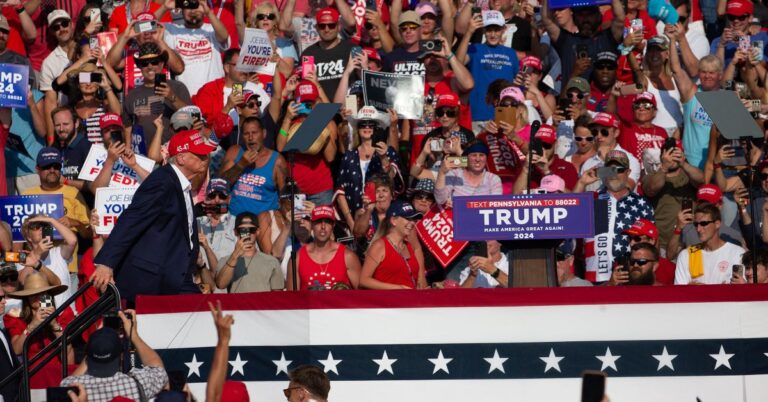“We are going to defeat the bad Joe Biden,” Donald Trump promised a rally in Butler, Pennsylvania. “And we are going to take our country back. We are going to take it back. Our country, our country has been taken from us. One of the greatest crimes is what they’ve done these last four years!” Trump then lashed out at immigrants, after which a gunman on a nearby rooftop opened fire on the rally attendees, wounding Trump in the ear, killing one attendee and sending two more to the hospital in critical condition.
In a shocking move, as he left the stage surrounded by Secret Service agents, Trump pumped his fist and yelled, “Fight, fight, fight!”, as the crowd responded by chanting, “USA!”
America is often a violent nation. Our history is filled with lynchings, assassinations, and mass shootings, and we are violent in public and private. But our current political climate is characterized by violence disguised as politics. Since the 1990s, the dominant framework for understanding American politics has been that “politics is war, and the enemy deceives.” Our political news is dominated by claims of outrage, accusations of corruption and hypocrisy, and accusations of conspiracy. All that violent rhetoric threatens the fragile trust on which democracy and political stability thrive.
read more: How does the assassination attempt on Donald Trump fit into America’s history of violence?
Politics is about solving problems through agreement, cooperation and compromise, but our public sphere is broken. Violence is always anti-democratic because it is the exercise of force, not persuasion.
Calling politics war diminishes the sacrifices made by actual soldiers and transforms our political opponents from good people (people with valid reasons for wanting different policies) into enemies (people who have no irredeemable qualities and must be destroyed).
Unfortunately, inciting violence has great rhetorical power, which is why so much of our political discourse is filled with cruel language. Throughout American history, and especially over the past decade, political leaders have discovered that ad hominem attacks are effective at delegitimizing and hating others, that threats of force and intimidation are effective at silencing opponents, that violent tropes attract attention, and that fear mobilizes voters.
But it’s not just people like Trump who have transformed our public sphere into a Hobbesian “war of all against all.” Research in media studies, psychology, sociology, and other fields has found that the media (print, radio, television, cable, podcasts, etc.) over-features crime news and other crime content. Our social media apps are designed to optimize engagement, which means emotionally charged “moralizing content” and “fake news” circulate more frequently than good old boring truth. All that consuming crime content can lead to what researchers call “mean world syndrome,” which makes us overestimate the likelihood of being a victim of crime.
read more: A hard look at America’s recent history of political violence
Despite its long history of violence, the United States is actually a pretty safe place. Violent crime in the U.S. has steadily declined since its peak in 1991 and is still near all-time lows, according to FBI statistics. But the “mean world syndrome” may help explain why a record 95% of Republicans, according to Gallup, believe that “violence does not exist.” more Today’s “state crime”: Everyone, especially conservative news consumers, believes they live in a mean, hostile world. People are so scared of the media and political information they consume that they’re buying a ton of guns.
Trump has built his political persona on a heroic story of risking everything to save the country. As I explain in my book, Demagogue for President: The Rhetorical Genius of Donald TrumpIn his 2016 presidential campaign, Trump told Americans a story of sin and redemption, claiming that as a former “ultimate insider”, he knew how the system was rigged and that only he could fix it. His 2024 campaign is based on themes of persecution and revenge, claiming in a popular meme that “They’re not after me, they’re after you. I’m just getting in the way” and vowing to “retaliate” against his political opponents.
Campaigning on such violent themes may make political sense, but it does nothing to serve American democracy. Treating opponents as enemies trying to attack you does nothing to solve political problems. Instead, it stokes resentment, erodes trust and camaraderie, and increases the likelihood of actual violence.
“We are friends, not enemies,” Abraham Lincoln said in his first inaugural address. “We must not be enemies. Though passions may strain, we must not sever the bonds of our affections.” Politicians and the media may tell you otherwise, but politics is not war; war is war.

